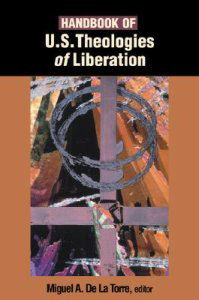
|
Posted April 2, 2005
Book: Handbook of U.S. Theologies of Liberation Editor: Miguel A. De La Torre Chalice Press, St. Louis, MO pp. 339 An excerpt from the Jacket:
An Excerpt from the Book: Liberation Theology’s God-talk Theology is God-talk, but it is not God talking; it is we humans who are doing the talking. Theology is a human enterprise filled with competing claims about who God is, about who we are, and about the world of vast resources God has created — it is presumed — for human companionship, stewardship, and consumption (Gen. 1:27ff). Within the human family, there is splendid diversity of race, gender and sexual orientation. Christians are able to affirm God’s “foreseeing care” for and “guardianship” of the finite, dependent creatures we happen to be in the gift of each other, and we certainly attribute to God’s providence the gift of God’s own son, Jesus, both as a sacrifice and as an exemplar of sacrificial love. This is perhaps the reason it is consistently signified within Christian scriptural and preaching traditions that God is, that “God is love,” and that God loves us. The love of God for us is at once transcendent and immediate, spontaneous and gratuitous, and produces a response of mutual and embodied love in us. Orthodox perspectives that begin with the Bible are akin to theistic liberation perspectives that affirm the sovereignty of God over that of putative authorities. Liberation God-talk also speaks of God as Creator, Redeemer, Sustainer; as Giver and Gift. That is, liberation God-talks speaks of love and providence of God, but it does so not only mystically and scripturally, but also historically. Liberation God-talk speaks of the ways in which humankind has experienced the gifts of God and interpreted the significance of both the giving and the given-ness. Liberation God-talk does not speak abstractly, apart from the concrete realities of people who are stratified favorably and unfavorably by the race, gender, sexual orientation, able-bodiedness, etc., with which they are endowed, and by the social class arrangements of the cultures and economies in which they live and work. Liberation God-talk from the lower tiers – the “underside” – of human history and experience attempts to demystify interpretations and arrogations of the Reality and Power in and beyond us that reify and contribute to the oppression of individuals and whole classes of people. Black, Hispanic, womanist and feminist theologians therefore have not attempted to create logical proofs for the existence, essence, and activity of God as an object of abstract contemplation. Rather, the survival and creative self-expression of theologies of liberation conducted on the margins of U.S. society emerged out of reflection on their people’s struggles for freedom and ontological recognition as beneficiaries, agents, and interpreters of God’s love and providence in the midst of their common experience of oppression. Table of Contents:Part 1: Thematic Essays1. God JoAnne Marie Terrell 2. Christ Carter Heyward 3. The Holy Spirit Elizabeth Conde-Frazier 4. Trinity Luis G. Pedraja 5. Church Stacey M. Floyd-Thomas 6. Anthropology Andrea Smith 7. Scripture Miguel A. De La Torre 8. Ethics Darryl M. Trimiew 9. Sin Andrew Sung Park 10. Spirituality Karen Baker-Fletcher 11. Eschatology Luis N. Rivera-Pagan Part 2: Contextual Theology 12. Latin American Liberation Theology Phillip Berryman 13. African Americans Will Coleman 14. Hispanics Edwin David Aponte 15. Asian Americans Seung Ai Yang 16. Black Theology Dwight N. Hopkins 17. Latino/a Theology Justo L. Gonzalez 18. Asian American Theology Fumitaka Matsuoka 19. American Indian Traditions Tink Tinker 20. Feminist Theology Karen K. Seat 21. Lesbian and Gay Theologies Daniel T. Spencer 22. Theology of the Poor Deborah W. Little 23. Environmental Racism Steven Bouma-Prediger 24. Postcolonialism and Liberation Musa W. Dube |
|
